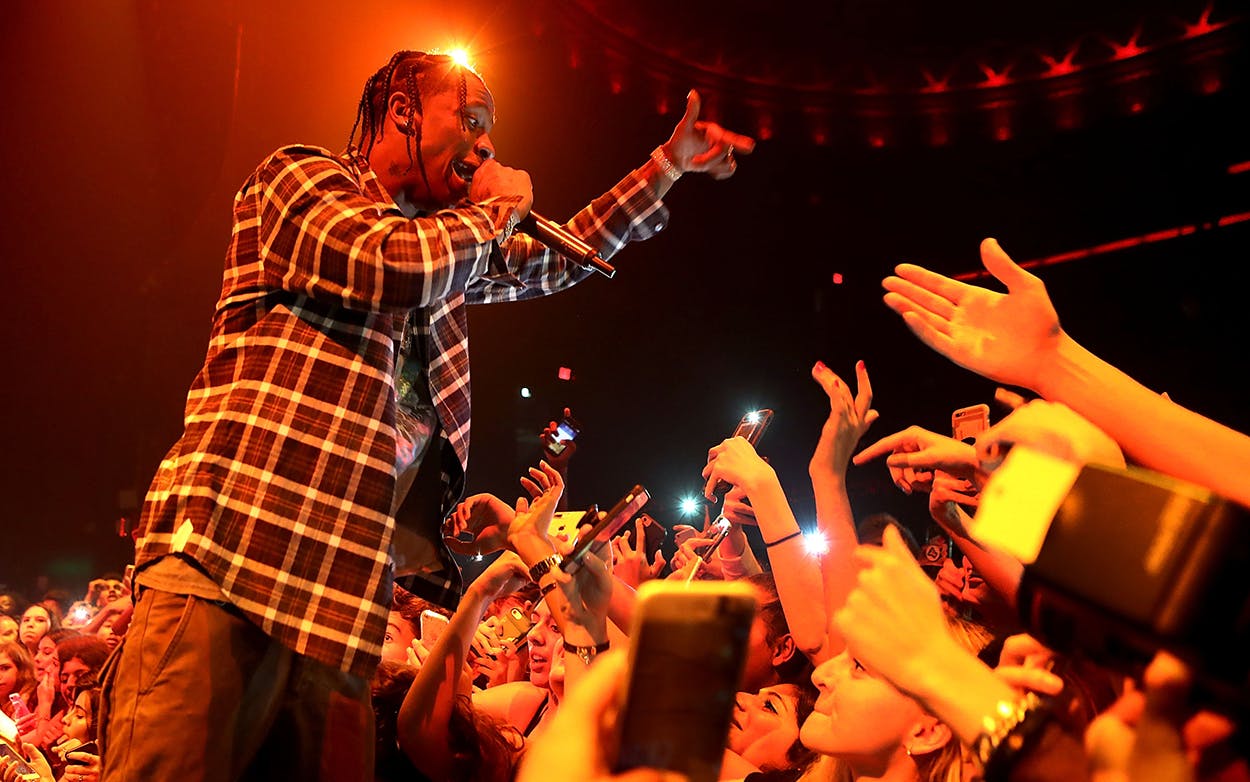Catastrophe can strike anyone at any time. Savings can run thin. Insurance can lapse. Life can throw unexpected tragedies at even the best prepared among us. That’s why the U.S. has social safety net programs: Medicare, Medicaid, Social Security, and others that help people weather the worst calamities and get back on their feet. But as that safety net has grown smaller, there’s been a rise in stories about people looking for (and often finding) help in unexpected places, like the benevolence of a Houston rapper with the number one album in the country.
Last week, Travis Scott pledged that he’d celebrate the success of his new album, Astroworld, by giving back to his fans—specifically, by using the Cash app to give away $100,000 to those in need. (Scott’s representatives didn’t confirm whether the money-transfer service was a sponsor of the project or if he chose them independently.)
A young man named Peter Valdriz tweeted at the rapper that his mom had died a few days earlier, and that a cash gift would help defray the funeral expenses. Three hours later, Valdriz posted a screenshot of a receipt for $800 from $travisscott within the app. Scott included a note saying that the money wasn’t much, but he hoped it would help.
Still can’t believe it. Thanks again @trvisXX pic.twitter.com/CLkpV0ZBKi
— P-Loading (@impistolpete33) August 15, 2018
It’s not just Valdriz. Americans who find themselves in crisis are increasingly relying on unconventional sources of financial support—and on going viral. In Florida, a teacher who needed more sick leave than his school district provided to complete chemotherapy became a national story after his fellow teachers donated more than one hundred days of sick time to him; in Fort Worth, a teacher who couldn’t get sick days to care for her thirteen-year-old daughter undergoing treatment for a brain tumor turned to social media to push for help from the school district.
Even kids are recognizing that a stranger’s generosity offers a better shot at support than our social safety net. A few weeks before Scott began his campaign to give away $100,000, six-year-old Sophia Chavez of El Paso decided to take a family crisis into her own hands. She opened a lemonade stand in front of her house, selling cold drinks at $1 a glass to customers who wanted some refreshment—and a chance to help her family while her mother was going through treatment for colon cancer. As her older brother Johnathan told KTSM, Sophia may be too young to understand what cancer is, but she understands that her mom hasn’t been able to work since she got sick. “Feeling happy makes my mom feel better,” Sophia told the station. “I’m making lemonade because I want to help my mom.”
It’s easy to admire a little girl who wants to help her mom any way that she can, or to appreciate when a celebrity uses their wealth to give back to those in need. But paying for cancer treatment isn’t optional. Nor are living costs when a parent is too sick to work, or funeral expenses. When people have to rely on the gumption of their bootstrapping six-year-olds, the generosity of a rapper, or the kindness of crowdfunding strangers on the internet to pay for urgently needed care, it reveals a social safety net that is, at best, dysfunctional.
It’s common to see stories in which someone went viral on social media and got help heralded as heartwarming examples of how people come together to take care of each other. And they are, to some extent. It’s certainly better to see someone become the subject of a crowdfunding campaign than for them to go without cancer treatment or go into debt to bury a loved one. (Four days before Valdriz tweeted to Scott, he tweeted, “Damn it’s so expensive to die.”)
But those things happen every day, in cases when Travis Scott isn’t watching. It’s not wrong to feel uplifted when you hear about people doing something kind for a stranger, but for every viral story in which someone stepped up to save the day, there are countless untold tales of those whose suffering wasn’t alleviated by the timely intervention of an unexpected helping hand. And until we’re able to take care of each other systemically, each feel-good story in which benevolent strangers saved the day is also a reminder of how close everyone is to being part of an unacknowledged tragedy.
- More About:
- Music
- Travis Scott








